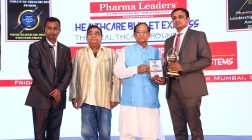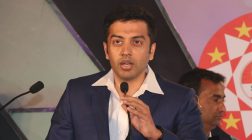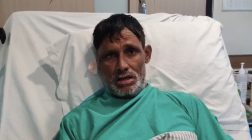Pharmaleaders 2014 Speaker Dr. Sanjeev Kanoria to share the experience of a Banker & a Successful Liver Surgeon at Pharma Summit 2014
Challenges & Opportunities in Global Healthcare – Lessons & Experiences from India & Europe. Dr. Sanjeev Kanoria, Vice Chairman, Austrain Anadi Bank, Chairman, Advina Healthcare Co Ltd, Chairman, Suasth Healthcare India Pvt. Ltd
Dr Sanjeev Kanoria is the Managing Director & Senior Consultant surgeon at Suasth Liver Centre (Institute for liver transplant and surgery) at Dr L H Hiranandani Hospital
Qualifications
- MBBS from University of Calcutta in 1988
- FRCS (Fellowship of the Royal College of Surgeons) (England & Glasgow) in 1992
- MBA (London Business School) in 1997
- FRCS (Transplant) from intercollegiate board of UK in 2008
- PhD (University College London) in 2009
Biosketch
Dr Sanjeev Kanoria is the Managing Director & Senior Consultant surgeon at Suasth Liver Centre (Institute for liver transplant and surgery) at Dr L H Hiranandani Hospital.
Dr Sanjeev is a qualified surgeon with FRCS from the surgical colleges in UK including transplantation and is on the General Medical Council (GMC) specialist Register in the UK. He has been working in the field of liver transplant and Hepatopancreatobiliary (HPB) surgery for over 15 years.
He has completed certified post graduate training from well known liver transplant centers in UK and India with leading surgeons in the field: Kings College, Royal Free Hospital and Medanta and is skilled in performing adult, pediatric liver transplantation and complex liver and pancreatic surgical oncology surgery. He was part of the liver cancer network in London and has received commendation on his surgical skills and training junior surgeons in performing complex liver transplant procedures. He was voted as an outstanding teacher of surgery by medical students at the Royal Free Hospital and UCLH Medical School in London.
He received a category 1 PhD from University College London, for innovative research in reducing liver injury and his academic work has been highly rated. He has published numerous international papers and has received awards and grants for his work in reducing liver injury during surgery.He has co-authored the chapter on liver disease in the latest edition of the well known international textbook of surgery: Bailey & Love, Short Practice of Surgery; 26th edition. He obtained a MBA from London business school, where his thesis on reinventing health care was awarded a distinction. He has recently been included in the Who’s Who of Healthcare and has been nominated for an Order of the British Empire for his service to health care over the last 20 years in the UK.His passion is to support and develop a high quality, yet affordable liver transplant service in India. With this aim and using his management and organizational skills he has started Suasth Liver Centre an innovative team approach for providing high quality liver transplant services in India.
Liver Surgeon Sanjeev Kanoria is Now a Banker Too. Talk about many hats: Born into a Marwari entrepreneurial family in Kolkata, Sanjeev Kanoria is an expert in liver transplant surgery and, now, the owner of an Austrian bank. This is apart from his health care business in the UK
t was a slightly nervous group of employees who had gathered at the Hypo Alpe-Adria Bank headquarters in Klagenfurt in southern Austria in December 2013. They were waiting to hear the bank’s new owner outline his plans. The 178-year-old organisation they worked for had a proud history but it had been in trouble in the recent past, particularly after the economic meltdown in 2008. In 2009, the Austrian government was forced to take it over from BayernLB, one of Germany’s nine Landesbanks, to avoid a collapse that would have sent shock waves through central and east Europe.
A chunk of Hypo bank, as it is known, managed to get back on its feet in the next three years and, in 2012, the Austrian government carved out this domestic unit for re-privatisation. The 400-odd employees who had gathered in December 2013—many of whom had been on the bank’s rolls for decades—were part of this unit that was focussed on retail banking. The deal to sell the bank had just been announced in Vienna and there was curiosity about the man who bought it. After all, the new owner, Dr Sanjeev Kanoria, a British surgeon specialising in liver transplants, had as unlikely a background for a banker as anybody could imagine.
Kanoria, who had thrown his hat into the ring in May 2013, bought the bank in December for $90 million after approvals from the Austrian regulator. In the town hall meeting with the employees on December 17, he outlined his strategy for the bank’s future. To start off, he reassured the staff that no one would lose their job. The bank, which has 14 branches in the region, would remain focussed on retail and would look for ways to grow. The immediate steps would be focussed on cutting out wasteful costs and diversifying risks. Kanoria revealed that he planned to take the bank to the UK by the end of 2014. This would allow him to leverage his existing business networks and allow the bank to grow outside Austria.Some would say that Kanoria is walking a path that is by now rather well-trodden. In the past decade, Europeans have become accustomed to entrepreneurs of Indian origin buying distressed assets and successfully turning them around. Of course, the significant difference here is that the asset is not a steel mill or a power project, but a bank. By February, Hypo bank will have a new corporate identity that reflects its Carinthian (south Austrian) heritage, but with an Indian touch.
Dig a little deeper into Kanoria’s background and you will find some of the answers to his multiplicity of careers. The 50-year-old has been an entrepreneur as much as a medical practitioner. Over the past 15 years, he has built a chain of 22 nursing homes in the UK. His company, Advinia Healthcare, which was grown entirely through acquisition of nursing homes, specialises in catering to patients that need dementia care and chronic care.His wife Sangita has been a major contributor in building the business. While he struggled through his PhD for innovative research in reducing liver injury, Sangita managed operations with professional teams. Though not very large, Advinia has now grown to be a niche health care provider in the UK with 1,000 employees and a turnover of $40 million.Kanoria’s other connection to the world of business and finance is ancestral. He is the second of five brothers from the Kolkata-based Kanoria family. His father and brother set up leasing and finance company Srei Infrastructure Finance in Kolkata 25 years ago; this is now run by the doctor’s two brothers Hemant and Sunil. Though Kanoria has a share in the family business, his brothers operate independently. Meanwhile, Hemant and Sunil have no stake in Advinia or the new bank business in Austria.
| Kanoria’s wife Sangita has been a major contributor in building Advinia Healthcare. While he struggled through his PhD on research in reducing liver injury, Sangita managed operations with the professional teams |
Forbes India caught up with Kanoria in Mumbai, where he spends a large part of his time these days. He had performed a nine-hour-long liver transplant operation at the Hiranandani hospital the previous day; the liver had been harvested the day before from a brain dead patient. Finding donors is still a big problem in India. Though this is the seventh transplant operation completed by Kanoria in Mumbai, he is still working towards putting together a full-time transplant team in the city.
In fact, over the past two years, Kanoria has focussed on finding ways to enter the Indian health care business. His first project is a 500-bed multi-speciality hospital in Navi Mumbai. The hospital, named Su’asth (that translates to ‘good health’), is located near the Pune Expressway, and will focus on accident and trauma care, organ transplant and cancer therapy. The Rs 450 crore project will have India’s first proton beam accelerator, which helps zap tumours by localising radiation dosage. Though the potential of the health care business brought the doctor to India, the going has not been easy. After constructing about 2.5 lakh square feet (about two-thirds) of the hospital premises, CIDCO, the town planning agency responsible for projects in Navi Mumbai, stopped further construction in 2012. Work on the project was halted for 14 months. “Working with Indian bureaucrats is frustrating,” says Kanoria, and the goalposts keep moving. “CIDCO, which cleared the project initially, now says Su’asth will have to adhere to CRZ regulations of 1991,” he says. Matters are now sorted; Kanoria is re-mobilising the contractors and the hospital is likely to be ready by the end of this year.
A fundamental principle for Kanoria is to build his business step by step. He hopes to follow a similar strategy for health care expansion in India. Many of these lessons emerged from his year-and-a-half-long stint with consulting firm McKinsey in the UK, where he worked with clients across various businesses.On a more philosophical level, Kanoria draws parallels between medicine and banking. Both, he says, are not merely professions but vocations. “People look to priests to save their souls, to doctors to save their bodies, and, similarly, they look at bankers to save their hard-earned money,” he says. “So much trust is involved. Over time people forgot their fiduciary duty and got greedy. If run well, with a low-risk profile, banking is a great proposition for customers and society.”
The stress in European banking since 2008 is certainly proof of this. The European Central Bank’s ‘Financial Stability Review’ says that signs of systemic stress have reduced in 2013. However, the outlook for bank profitability is weak; this is partly because the process of bank restructuring—including downsizing—remains incomplete. Aggravating this situation is the lower availability of bank funding in some countries.
Greed played a key role in Hypo bank’s troubles, says Kanoria. The incentive structure promoted this greed and there was a complete disconnect with customers as well as employees. Meeting targets was the objective and projects were being financed at highly inflated costs with the approval of bank managers. He cites the example of the promoters of a solar panel manufacturing plant who borrowed from the bank. They had claimed that the project was being set up for $55 million. Audits later showed the actual cost was only $13 million.The government has since cleaned up the bank and strengthened the balance sheet. “Our job is to provide leadership and ways to grow. We are going back to basics now,” Kanoria says. Hypo bank has assets of about €3.5 billion and capital adequacy of 10 percent. It does not need any more funds now.
Kanoria says his first step will be to increase the bank’s customer and market share within Austria. He wants to do this by lending to more businesses and SMEs. Once this is done, he will take the bank to London. The UK plan is largely to leverage on his business contacts and wholesale lending. “We have a good network of clients as well as the Indian diaspora and we can surely support them with the bank,” he says.
Next, Kanoria plans to bring the bank to India. The idea is to focus on lending to companies who are involved in India-EU trade. But this will depend on the regulatory situation in the country then, he points out.Vishwavir Ahuja, managing director and CEO of Ratnakar Bank, says the bank’s focus will have to be wholesale banking. Foreign banks have not been very successful at retail banking in India—most have either wound up their bank or sold them. Also, Ahuja says, Indian regulators and customers are likely to look at an Austro-German bank favourably, because they inspire more confidence with their conservative practices.
In his family’s firm, at Srei Infra, the oldest Kanoria brother, Hemant, has been pushing for permission to start a bank.Srei is one of the 25 firms on the Reserve Bank of India’s shortlist of banks waiting for approval. It is not clear yet whether the two brothers will collaborate on this venture. Speaking to the press after the Hypo bank deal was announced, Hemant Kanoria had said that neither he nor Srei had any connection with the acquisition. The two businesses, however, do have a common link. Dr Martin Czurda, a senior Dutch banker who originally brought the Hypo bank deal to Kanoria, also sits on the Srei Infra board as an independent director. Czurda also happens to be the new CEO of Hypo bank. While this link may be coincidental, it is certainly worth noting. Ratnakar Bank’s Ahuja says, even if the brothers are at arms-length, there would be synergies they could leverage upon.Kanoria, however, has his hands full with the task of operating a profitable bank in Europe; global bank analysts say the challenges are numerous. The protracted economic downturn since 2011 has impacted credit quality, while interest margins have remained compressed. The problems in the banks are compounded by those within the economies. Subdued growth prospects and high unemployment continue to weigh on bank performance in many Euro-area countries. Hypo bank’s international unit, the one still owned by the Austrian government, recently said it needed a further €1.05 billion in state aid this year to avoid breaching minimum capital requirements.But Kanoria says he is not too troubled by this. The Austrian economy is among the strongest in the continent and unemployment is low. He says he is inspired by Lakshmi Mittal’s courage to take over companies and turn them around. He can do with the confidence—as things stand in Europe, both he and Mittal will need plenty of fortitude to tide through the tough times.
The Hinduja Example
The London-based Hinduja brothers have been in the banking business in Europe since 1994. The Geneva-based Hinduja Bank has its roots as a finance company that was in the asset management business. Over the years, the bank has expanded to India and the Middle East. It has 200 employees and is focussed on wealth management and trade finance. It was among the few international banks to conduct transactions for Swiss companies doing business in Iran.The bank’s India presence is through subsidiary company Paterson Securities, one of India’s oldest and leading stock broking firms. The consolidated banking operation is under the regulation and supervision of the Swiss Federal Banking Commission. The Hindujas have a much bigger banking presence through IndusInd Bank, which is active in retail, corporate and transaction banking.











